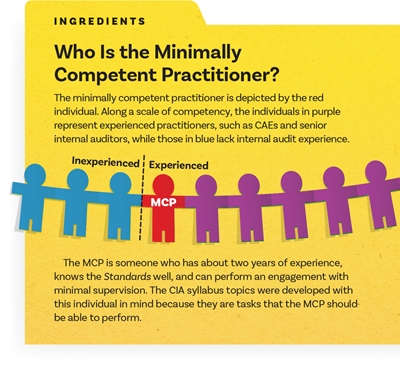The CIA certification exam consists of three parts, with the first two parts featuring 125 questions, and the third part featuring 100 questions. Part 1 covers the essentials of internal auditing, part 2 covers the practice of internal auditing, and part 3 covers the business knowledge required for internal auditing. Currently, The IIA’s exam development team has created thousands of questions that test the many skills a competent internal auditor must possess to fulfill his or her responsibilities.
Many ingredients go into the development of The IIA’s certification program to ensure it is globally relevant for today’s internal audit environment. Frequent job analysis studies, focus groups, surveys, collaboration with subject matter experts from around the world, and ample professional and psychometric research combine to create a fair and respected certification. From start to finish, the CIA program ensures that exam content can be understood and applied by certification candidates regardless of where they are in the world.
Start With Questions
It all starts with exam questions — which means it really all starts with the writers who write exam questions. Prospective writers go through a selection process to ensure their internal audit knowledge is current and global. Before becoming a writer, each prospective author must pass an item writers quiz. This confirms they have a basic understanding of content development, as well as ensures that their internal audit expertise is adequate to meet the task of exam content development. CIA question writers are certified, practicing internal auditors and IIA members who wish to give back to their profession while also obtaining continuing professional education credits for their accepted work.
Input from certified IIA members from around the globe is crucial to developing questions for the CIA exam. That is because some questions could include concepts that are not globally recognized. For example, personal checks are not a part of the financial systems of countries such as Estonia and Japan — something The IIA’s exam development team discovered when a question that included personal checks was rejected by reviewers in Eastern Europe and Asia. Such cultural differences might not be recognized if the team did not collaborate with certified internal audit experts from diverse backgrounds, countries, and industries.
One of these experts is Anna Kon, head of Internal Audit at Enefit Green AS in Tallinn, Estonia, who is among many internal audit leaders who write questions for the CIA exam. Writers such as Kon must navigate through a bevy of factors that could affect exam question submissions. Each writer is different, with a personal writing style, area of expertise, country of origin, and unique approach to content development.
For Kon, it’s best to use real-world scenarios when writing exam questions, specifically ones she’s experienced during her career. “There are so many different situations I encounter at work, and many of them fit the CIA syllabus,” she says. This prudent practice results in questions that task candidates with applying knowledge, rather than simply recalling information. “It’s a good opportunity to think through something that has happened at work,” she explains. “I can create a question from it so that others can learn from the experience.”
Kon also shares that writing questions is fun. Interacting with fellow internal auditors from around the world allows her to expand her understanding of the practices that are common in different countries and cultures. Moreover, she’s also able to network with fellow writers from around the globe and deepen her understanding of The IIA’s International Standards for the Professional Practice of Internal Auditing and related guidance.
In turn, Kon learns more about emerging risks, trends, and practices, and even earns CPE. The CPE is particularly nice, as Estonian law requires her to report CPE hours to maintain her good standing as an internal auditor. Together, all of this strengthens Kon’s abilities as an internal auditor.
Experts Review Content
Once writers like Kon have developed questions, it’s up to audit experts such as Eleftherios Tsintzas to review them. Tsintzas, CAE of Thessaloniki Port Authority in Greece, is one of many subject matter “team leaders” who review the content, keeping a keen eye out for anything that could potentially invalidate the question. Each reviewer is a member of The IIA’s Exam Development Committee, which ensures the CIA exam is aligned with current global internal audit practices and the Standards. “One of the EDC’s main activities is to ensure the CIA exam questions are aligned with the syllabus and are suitable for the minimally competent practitioner,” Tsintzas says (see “Who Is the Minimally Competent Practitioner?” below).
At this stage, reviewers assess factors such as subjectivity, globality, and level of difficulty. Tsintzas says his favorite part of reviewing questions is seeing how authors approach the Standards and internal audit methodology regarding emerging practices, trends, risks, and technologies. “When there is a question that is subjective, or is weak and cannot be easily modified to move to the next stage of the question review, we try to provide feedback to the author to revise the question’s weaknesses,” he explains. “The question can then be submitted again to the question review process and, if accepted, moved to the next stage.”
The feedback also can give authors insight into reviewers’ concerns. “This allows the author to improve future exam questions,” Tsintzas explains. Once the team leader deems the questions acceptable, they are reviewed again by a wider panel of experts from the EDC. This process allows each reviewer an opportunity to ensure that the questions are valid in his or her specific geographic location. Each reviewer can suggest updates to questions or even reject a question that is not globally relevant.
Tsintzas says he operates in his role with a global mindset. His experience across many countries, cultures, and industries allows him to determine if a specific concept in a question may not work in a particular region. For example, he previously worked in Romania for several years, where he learned internal audit practices in that country, as well as those in neighboring Bulgaria, Serbia, and other Eastern European countries. “When I review a CIA question, I consider the practices and the conditions I encounter when I’m working in Greece or when I used to work in various Eastern European countries,” Tsintzas explains. “My main focus when reviewing CIA exam questions is to ensure that they’re applicable to countries in the European Union, Eastern Europe, and Greece.”
Following this vital global review, The IIA’s exam development team reviews the questions that were accepted to ensure that they are grammatically correct and test the candidate at the appropriate level of assessment and difficulty. Then, the content is translated into the 12 languages in which the CIA is offered. Finally, the questions find their way into the CIA exams that certification candidates aspire to pass.
Ensure the Value of Certification
Tsintzas says he appreciates the value the CIA brings to professional credibility. First, he says the CIA is the only certification that will help internal auditors dive deep into the Standards and the actual practice of internal auditing. Second, employers know that an individual who is certified as an internal auditor not only holds the basic knowledge to successfully fulfill his or her responsibilities, but also is committed to personal growth and is positioned for career advancement.
Jorge Badillo, internal audit manager for SCM Minera Lumina Copper in Santiago, Chile, is an example of what certification can do for a practitioner’s career. With more than 25 years of experience, Badillo is a thought leader in several emerging markets in South America and has worked in Brazil, Canada, Ecuador, Japan, Poland, and the U.S. He led the charge in promoting and advocating the importance of the CIA designation in Ecuador and Chile by achieving certification for himself and encouraging his peers and colleagues to pursue the CIA.
Badillo says without the CIA, he would not have landed his first internal audit position, which launched his career. “Without my CIA, I would not appear in job searches, and I could have missed out on employment opportunities,” he says.
Now, alongside his peers on The IIA’s Professional Certifications Board, Badillo helps ensure that CIA content is globally applicable. The committee meets when necessary to discuss internal audit terms and concepts that the review panel requests further expertise on. In these instances, the exam content is amended, if possible, to ensure that it is appropriate for candidates no matter where they are located. If the board cannot revise content to be globally appropriate, it is not added to the CIA exam.
Becoming an Exam Writer
Are you an IIA member and CIA holder who is interested in writing for the CIA program? Get involved and enjoy the benefits:
- Network and collaborate with a global team.
- Deepen your knowledge of the Standards.
- Continue to learn internal audit best practices.
- Evolve with the profession.
- Give back to the next generation of internal auditors.
Apply at examwriter@theiia.org
Making a Commitment
To Badillo, certification demonstrates something more than internal audit knowledge — it also demonstrates commitment. “There are many who go to training courses, but they don’t take the next step — the CIA exam,” he says. “Completing the exam shows discipline and persistence in pursuit of objectives.”
Reflecting on his own certification journey, Tsintzas says he encourages members of his team to pursue the CIA. “Being CIAs helps them perform their everyday work in a more structured, efficient, and effective way,” he explains. “It assists his team in accomplishing its mission and helps the organization gain value.”
Volunteers such as Kon, Tsintzas, and Badillo help ensure that the CIA remains a valuable, global credential. Their expertise shines brightly alongside The IIA’s many subject matter experts who help bring the CIA to life through a global lens.
IIA Resources
Certified Internal Auditor®
CIA Exam Preparation Instructor-led Course Part 1: Essentials of Internal Auditing
CIA Exam Preparation Instructor-led Course Part 2: Practice of Internal Auditing
CIA Exam Preparation Instructor-led Course Part 3: Business Knowledge for Internal Auditing
CIA Challenge Exam




